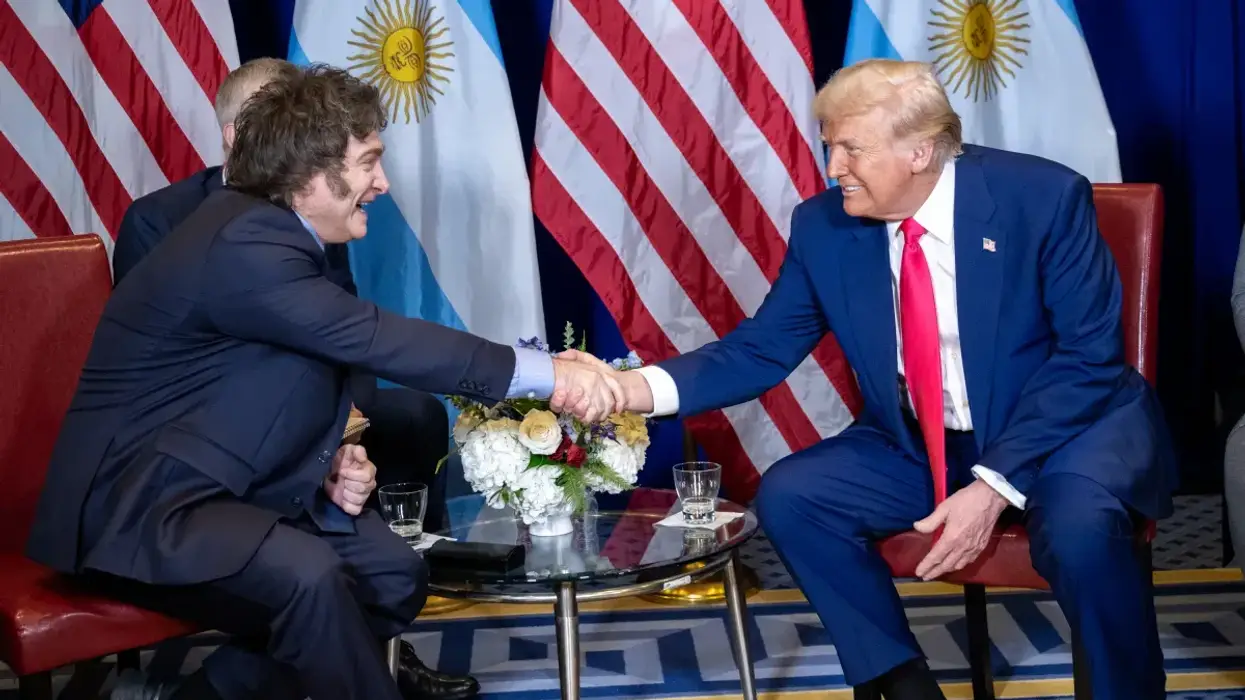Boosted by Trump Extortion Threat Over US Bailout Funds, Milei Nabs Win in Argentina Midterms
"He was a big victor, and he had a lot of help from us," the president boasted.
President Donald Trump on Monday took credit after his political ally, Argentine President Javier Milei, scored a major victory in his country's midterm elections following Trump's decision to bail out the South American country's struggling economy.
According to BBC, Milei's La Libertad Avanza party on Sunday won 41% of the vote, helping it secure more than half of contested Senate seats and just under half of contested lower-house seats.
While speaking to reporters aboard Air Force One, Trump boasted of his administration's efforts to help Milei secure a victory that will help him push through his radical right-wing austerity agenda that had previously been kept in check by opposition parties, which had overturned his vetos on laws that aimed to increase funding for state universities, people with disabilities, and children's healthcare.
"He was a big victor, and he had a lot of help from us," Trump said, referring to Milei. "He had a lot of help. I gave him an endorsement, a very strong endorsement."
Trump: "In Argentina, I want to congratulate the victor. And he had a lot of help from us." pic.twitter.com/vG3pamNuEe
— Aaron Rupar (@atrupar) October 27, 2025
The Trump administration last month initiated a $20 billion bailout for Argentina intended to stabilize the country’s currency, which has seen its value plummet to dangerous lows over the last several months. In addition, Trump and Treasury Secretary Scott Bessent have orchestrated another $20 billion bailout with private funds to support the nation’s beleaguered economy.
The bailouts have come as Trump has refused to use emergency funds to ensure that Americans who rely on food assistance can feed their families next month, as the Supplemental Nutrition Assistance Program is set to go unfunded due to the US government shutdown.
Trump emphasized that the bailout was entirely contingent on Milei's political success in the midterm elections, and that it would be rescinded if his party fared poorly.
"If he loses, we're not going to be generous with Argentina," Trump said earlier this month.
“If he loses, we will not be generous with Argentina.”
- Trump warns Argentina’s voters that U.S. financial backing, now at $20b and potentially rising to $40b, depends on Milei’s party’s performance in the upcoming midterm elections @atrupar pic.twitter.com/zpuiFuuYWi
— The Intellectualist (@highbrow_nobrow) October 16, 2025
Milei's political future appeared much more tenuous just one month ago, when his party lost Buenos Aires provincial elections in what some political observers believed were an ill omen for this month's midterms. Milei had also been rocked corruption scandals, including an alleged bribery scheme involving his sister, Karina Milei.
Matt Stoller, researcher at the American Economic Liberties Project, directly linked Trump's coercion campaign to Milei's political success.
"It turns out that Argentine voters would prefer Trump give them dollars for free than have another financial crisis," he wrote on X. "Six weeks ago, Milei lost Buenos Aires by 14%. Today he won it. I wonder what changed."
Stoller rejected a Wall Street Journal analysis claiming Argentinian voters, who are struggling with high unemployment numbers and surging prices on essentials, embraced "a free-market revolution" by voting for Milei.
"The reason for a massive swing to Milei in six weeks was Trump's offer of free dollars vs. the prospect of economic collapse," he said. "Nothing to do with free markets. A blatant lie."


